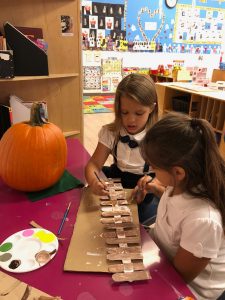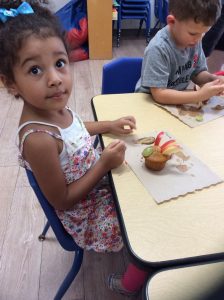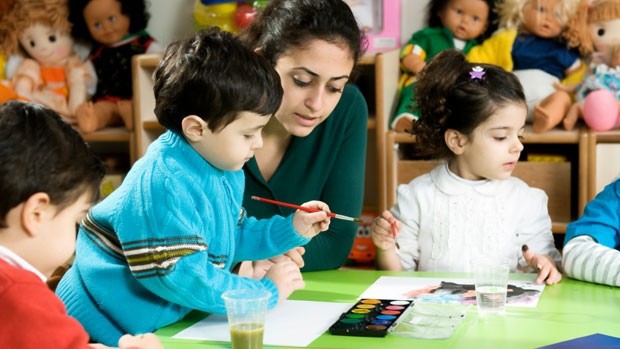From the moment parents discover that they are going to have their first child, their thoughts turn to quality childcare. Parents, naturally, want the very best for their children, from the nutritious food they eat to the activities they’re involved in, and, of course, the daycare center they are enrolled in each day. Your child’s daycare will become a significant part of his life, and honing in on the very best daycare for your child is likely a high priority. Are you wondering what to look for in a quality childcare center?
Are there signs of a structured, well-thought out daily schedule?
Young children thrive on structure and routine, and feel safe and well taken care of when the adult caregivers around them have planned their days with care. The best daycares will have lesson plans prepared which are appropriate to the children’s ages and developmental stages. Another sign that a daycare is organized and well-run is in the communications between the childcare center and the parents. If schedules, special events, and themes are posted in a place where parents can see them, or communicated to parents regularly, that’s a sure sign that the center is organized and is putting a great deal of thought into their ongoing schedule.
 Teachers should demonstrate an understanding of child development
Teachers should demonstrate an understanding of child development
The best daycare centers near you will employ staff with either enough experience or enough education in child development to truly understand each developmental stage. The developmental differences between infants, toddlers, and preschoolers are vast. The ability of a young toddler to regulate his emotions, control his body, learn, socialize, and navigate the world around him are immensely different from a child just a year older than him. Teachers who clearly understand what is typical at each developmental stage will be able to navigate the ups and downs of each age, and will be able to gently guide your child from one stage to the next as she grows under their care. Take a look at the toys and books available in the infant room, the toddler room, and the preschool room. Can you see the progression of the sophistication level of these items from classroom to classroom? Do you see a difference in the activities from class to class? These are great ways to tell whether the daycare you’re touring has a keen understanding of development and the progression from stage to stage.
Are the teachers empowered to create a dynamic environment?
At every daycare center, you’ll meet teachers in charge of each classroom, and a director who oversees the entire center. Directors have the important job of counseling teachers and steering them in the right direction, and making sure the daycare center is upholding its standards and its values. But a great daycare center empowers its teachers by allowing to make their own decisions within the scope of a program. They add their own creative ideas, and have control over their classrooms. When a teacher has input into their daily plans or over the lessons and activities that occur in their class, they’ll display a level of enthusiasm and commitment that every child will benefit from. For instance, if a teacher sees that their children have a keen interest in transportation, and has an idea for a great project that will build on this interest and get the kids working together, that teacher should be able to take that idea and make it happen. Take a look at the interactions between teachers and directors to determine whether this daycare center is a place where teachers are respected and empowered to give each day their all.
Look for signs of high engagement
The very best daycare centers will constantly encourage the engagement of each child with their surroundings, their activities, and their caregivers. When observing children in a classroom, take a look at what kinds of activities they are involved in, and how interested they are in each one. Also pay attention to how involved the teachers are in keeping each child engaged, playing, learning, and socializing. If a child appears bored or restless, does the teacher make an effort to get him involved in an activity which will engage him? If there are children who are a bit shy or anxious, are the teachers making an effort to help them feel tethered to a safe adult, while still encouraging them to focus on activities and their peers? A real focus on meeting each child where they are and helping them to engage in classroom activities in their own way is an indicator of a high-quality daycare center.
Keep child-to-caregiver ratios in mind
Various national accreditation agencies mandate ratios that are much smaller than most state requirements. The best daycare centers will be accredited and respect these highly important ratios. At the infant stage, there is an incredible demand on caregivers, from feeding to diapering to close body contact, and there must be enough caregivers to provide these basic, frequent, and vital needs to each baby in their care. For toddlers and preschoolers, a good ratio means that each child will feel safer, each activity will be supervised safely, and challenging situations will be handled with more ease. For instance, if one child in the classroom is having a difficult day or a tantrum, one caregiver may need to turn their attention to that child, and there should be enough caregivers in the class to keep activities, lessons, and routines running smoothly for the other children in the room.

Is a love for children apparent in all of the staff on site?
This may seem like a no-brainer, but there are many daycare centers that employ staff who may have become disillusioned with early childhood care, or may not have the sincere commitment to young children that parents should expect. The very best daycare center near you should employ adult caregivers, directors, and support staff who love children enough to honor and respect the big feelings, challenges, and unique qualities of each and every child. When you observe the classroom, do you see signs of affection between staff and children? Do children seem to feel loved and cared for? If there are difficult moments, do teachers and caregivers model patience, generosity, and respect toward the children in their care?
Look for an environment which fosters creativity
Take a look at the different sections of the daycare classroom. Are there dress-up clothes, different sizes, shapes, and colors of blocks, and a variety of age-appropriate toys on hand? Children need creativity in the form of dramatic play, building, art, and music. Do you see musical instruments on hand? Are there special songs sung at various parts of the day? Check out the art supplies, and look for smocks, paints, markers, clay, and crayons. Is there a sensory area with sand to squish or water to experiment with? Different stations throughout the classroom that are well-stocked with the kinds of supplies that allow children to flex their creative muscles are key in any good daycare center.
Take a look at a center’s turnover
There will always be some amount of turnover at any daycare center. Teachers’ personal situations change, they seek out other opportunities, and some go back to school or change direction. But a really well-run center does everything in their power to reduce turnover and to retain the best teachers and caregivers. And a great childcare center goes the extra mile to reduce their turnover for very good reason. Children grow to trust their teachers by developing relationships with them over time. When a teacher learns about your child’s temperament, unique needs, and likes and dislikes, that teacher can begin to foster a relationship with your child that makes them feel safe and cared for. It gives them a sense of continuity and predictability that is precious in young childhood. In order to be confident about a center’s ability to retain staff, ask the director about turnover and ask them what measures they have in place in order to retain valuable staff.
 What is the center’s approach to nutrition?
What is the center’s approach to nutrition?
While many daycare centers ask that parents pack snacks and lunches for their children, others provide meals for children in their care. Before enrolling your child, you may want to ask about the quality of the food they will be offering. A center that is concerned about the health of your child will serve a broad range of foods, with a focus on integrating fruits, vegetables, whole grains, and organic produce when available. Talk to potential daycare centers about the food they will be providing for your child to ensure that it meets the standards you set for your child’s wellness and nutrition.
Communication, communication, communication
The best daycare centers always offer consistent and robust communication between the center and the families enrolled. Ask potential centers how often they will communicate with you about your child, what types of updates you can expect, and how easy it is to reach staff members with any concerns or questions you have. A quality center will have a variety of channels in place for communication in order to make sure that they are building a proper home-school connection.
Take your time when researching, touring, and talking with various daycare centers. This decision is going to impact the wellbeing of your child. It will also have an effect on how relaxed and comfortable you feel when leaving your child each day. It’s important to feel entirely comfortable with the daycare center you’ve chosen, so don’t be afraid to linger awhile to observe the classroom or to ask the teachers and the director questions about how their childcare center operates. Choosing the very best daycare center for your child will pay dividends in terms of your child’s happiness and the wellbeing of your entire family.

